|
|
|
Sort Order |
|
|
|
Items / Page
|
|
|
|
|
|
|
| Srl | Item |
| 1 |
ID:
173437
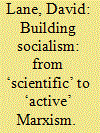

|
|
|
|
|
| Summary/Abstract |
Historical materialism envisages law-like tendencies (‘scientific’ Marxism) promoting the development of productive forces and, concurrently, a political praxis (‘active’ Marxism) requiring human intervention. These positions give rise to conflicting interpretations of Marxism: first to understand society, second to change it – to abolish economic exploitation. The twentieth century witnessed a shift in the locus of the contradictions of capitalism to the economically dependent territories of the imperial powers. Socialist parties, when in power and adopting a Leninist political praxis, furthered modernisation and were successful in reducing economic exploitation. The paper addresses the relationship between the scientific and praxis components of Marxism in contemporary global capitalism. It considers post-Marxist interpretations of the changing class structure, the rise of identity politics and the evolving nature of capital. Forms of domination, oppression and discrimination (bureaucracy, patriarchy, racism, militarism and credentialism) give rise to their own distinctive forms of power relations. It is contended that they should not be equated with Marx’s crucial insight into the nature of economic exploitation. Many current Marxist (and ‘post-Marxist’) writers adopt a ‘scientific’ position emphasising the inherent contradictions of capitalism. The author claims that without appropriate political praxis, the resolution of such contradictions is unlikely to transcend capitalism.
|
|
|
|
|
|
|
|
|
|
|
|
|
|
|
|
| 2 |
ID:
148286
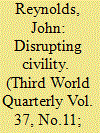

|
|
|
|
|
| Summary/Abstract |
This paper is a reflection on the role of intellectuals in engaging with Palestinian solidarity movements and liberation discourses, and on the place of international lawyers specifically within that context. The paper considers ‘the question of Palestine’ as a rigorous test for intellectuals in the Global North today, and examines particular debates over free speech, civility and balance that unfolded in the wake of Israel’s 2014 war on Gaza. It considers the interventions of international lawyers in these debates with reference to Edward Said’s ‘amateur’ and ‘professional’ intellectuals, and explores ways in which anti-colonial international lawyers (as amateur intellectuals) can transcend prevailing professional orthodoxies to deploy language, arguments or tactics that rupture liberal legal processes and narratives on Palestine.
|
|
|
|
|
|
|
|
|
|
|
|
|
|
|
|
| 3 |
ID:
129026
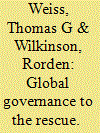

|
|
|
|
|
| Publication |
2014.
|
| Summary/Abstract |
International relations teeters on the edge of an abyss of irrelevance. As an academic pursuit, it has become disparate and fragmented. Those of us in the discipline have ceased to pursue greater clarity in the way that we understand the world around us. Moreover, we have failed as agents of change; that is, as purveyors of opinion and proposals about a better and fairer world order. As such, we no longer serve our students and those practitioners who seek our advice, or, for those of us who take on policy jobs, to push out the envelope of what is considered acceptable. Global governance offers one potentially compelling way of "saving international relations"- though it is not without its problems. This article outlines how and why. The argument unfolds in three parts. The first outlines why and how IR teeters on the edge of an abyss. The second offers a proposal for moving beyond the fragmentation and atomization that afflicts international relations. We suggest that one way of encouraging reengagement is to return to debating grand questions that used to be the sustenance of IR. The third part argues that global governance-appropriately and specifically framed to make it fit for purpose-offers an opportunity to return to these questions and, in so doing, reinvigorate our fragmented and atomized field.
|
|
|
|
|
|
|
|
|
|
|
|
|
|
|
|
| 4 |
ID:
148283
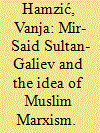

|
|
|
|
|
| Summary/Abstract |
This paper revisits the idea of Muslim Marxism, as espoused through the life and work of the Tatar Muslim and Bolshevik intellectual and revolutionary Mir-Said Sultan-Galiev (1892–1940). I argue that Sultan-Galiev’s oeuvre – a unique synthesis of Marxist, Muslim modernist, anti-colonial and Third World praxis – represents a path-breaking take on Muslim selfhood and practices of belonging.
|
|
|
|
|
|
|
|
|
|
|
|
|
|
|
|
| 5 |
ID:
103136
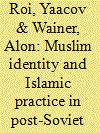

|
|
|
|
|
| Publication |
2009.
|
| Summary/Abstract |
After the dissolution of the Soviet Union, the newly independent countries of Central Asia had the opportunity to endorse religious freedom. Nevertheless, they chose for the most part to continue the policy of monitoring religious activity, on the pretext of protecting their countries from radical Islam. This study focuses on Islamic praxis in post-Soviet Central Asia. Based on a survey conducted in four Central Asian successor states (excluding Turkmenistan), it examines everyday Islam - observance of precepts, life-cycle rites, prayer and mosque attendance - as well as people's perceptions about the role of Islam in their lives and in the evolution of their societies and the place of Islam in local identity. The authors' findings have not always corresponded to usually accepted hypotheses and they have sought to analyse the reasons for this. Undoubtedly, the exigencies of the current political situation both act as a restraint on respondents in addressing the questions put to them and restrict their religious praxis outside the home. It is difficult to assess how far responses would have differed had the survey been conducted under more favourable circumstances; indeed, some of the questions may have been genuinely misinterpreted as a result of differences in outlook and the use of concepts.
|
|
|
|
|
|
|
|
|
|
|
|
|
|
|
|
| 6 |
ID:
092551
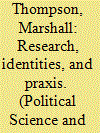

|
|
|
|
|
| Publication |
2009.
|
| Summary/Abstract |
Scientists seek to participate in the collective process of cumulative knowledge building. As scientists, we are bound to the principle of objective neutrality in the assessment of our data and in the formulation of our inferences and conclusions. However, the production of knowledge does not need to be, and some would say cannot be, a valueless process, devoid of opinion. The imperatives for the investigator are intellectual honesty, transparency in research, and objectivity in the assessment of data. If value judgments are accepted as permissible it is then worthwhile to discuss the relationships between the investigator's identity, those value judgments, and the design and conduct of research. Indeed, investigators possess multiple identities; these multiple identities may, at various times and places, aid or impede the research process. Moreover, these intersectional identities, and the inconsistency with which these identities are granted status in various environments, leave the researcher well positioned to explore social stratification, hierarchies of power, and inequality.
|
|
|
|
|
|
|
|
|
|
|
|
|
|
|
|
| 7 |
ID:
163821
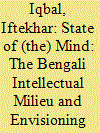

|
|
|
|
|
| Summary/Abstract |
Drawing on a new digital collection of oral interviews, this essay examines the place and meaning of the state in Bengali thought. In the immediate aftermath of decolonisation, East Bengal intellectuals, without substantial pre-engagement with the colonial state, favoured forms of political action or praxis that longed for a new state—a longing that culminated in the birth of Bangladesh in 1971. Intellectuals connected to West Bengal, already entrenched in their own economic and social multiverse, never entertained the idea of a new state outside India. Instead, a Foucauldian irreverence for the state and its elite became more dominant there, flourishing through Subaltern Studies. Despite these differences perceptible synergies in the Banglaphone thoughtscape took root in the 1980s that spoke to late Cold War anxieties about the future of participatory democracy and the public good. This convergence of thought across Bangladesh and West Bengal reflected the emergence of an intellectual who elided the notional boundaries of the post-colonial state, yet stood ambivalently before the crucible of neo-liberal temporality, exposing the limits of the discursive subject in the late twentieth-century Global South.
|
|
|
|
|
|
|
|
|
|
|
|
|
|
|
|
| 8 |
ID:
148278
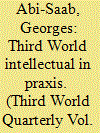

|
|
|
|
|
| Summary/Abstract |
In his closing keynote address for the TWAIL Cairo Conference, Professor Georges Abi-Saab engages with the conference theme ‘On Praxis and the Intellectual’ by considering the diverse roles that can be played by Third World international law intellectuals in trying to transform theory into social practice. He commences with an overview of the Third World’s engagement with international law thus far in the form of a ‘three act psychodrama’. Following from this, he explores the meanings of the terms ‘intellectual’ and ‘praxis’, noting that not all international lawyers are the former, and breaking the latter down into several stages in the spectrum between reflection and action. Professor Abi-Saab concludes with some examples of praxis from personal experience, including as a professor, teacher, and scholar of international law, ghostwriting for the UN Secretary-General, participation in country delegations, and as judge and arbitrator in numerous courts and tribunals. Through these examples he illustrates some of the different tactics available to the Third World intellectual including confrontation, participation, or operation ‘behind enemy lines’.
|
|
|
|
|
|
|
|
|
|
|
|
|
|
|
|
| 9 |
ID:
113850
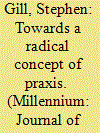

|
|
|
|
|
| Publication |
2012.
|
| Summary/Abstract |
This article argues for a radical conception of praxis in international relations. By praxis is meant those forms of critical theoretical and practical activity that are not only linked to understanding, explaining and acting in international relations but also transforming those relations to help constitute a more ethical, just and sustainable world order. The argument is developed as follows: (1) discussion of theoretical perspectives, and how they constitute dominant paradigms of International Relations in the West, particularly in the USA. Such dominant paradigms are shaped by a liberal ontology, opposed to Marxism and critical theory. (2) A critique of 'imperial common sense' that is bound up with US supremacy in an unjust world of deepening crises, growing inequality, social dislocations and unsustainable accumulation. Here my argument involves a dialectical strategy that critically addresses the nature, self-evidence and global influence of mainstream American International Relations. (3) A discussion of how new forms of praxis are emerging, seeking to develop radical alternatives that are sober, imaginative, sustainable and politically and ethically credible - in the multiple, diverse and new forms of political agency reflected in the figure of the 'post-modern Prince'. The article concludes by outlining elements of a radical research agenda to address significant intellectual, ethical and public policy issues in the emerging world order.
|
|
|
|
|
|
|
|
|
|
|
|
|
|
|
|
| 10 |
ID:
148277
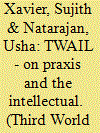

|
|
|
|
|
| Summary/Abstract |
This Special Issue emerges from the Third World Approaches to International Law (TWAIL) Cairo Conference in 2015 and addresses the conference theme, ‘On Praxis and the Intellectual’, by focusing on different aspects of the intellectual as a political actor. In introducing this Issue, we provide some background to the TWAIL network, movement, event, and publications; and delineate our own understandings of scholarly praxis as editors and conference organisers. Broadly, we understand praxis as the relationship between what we say as scholars and what we do – as the inextricability of theory from lived experience. Understood in this way, praxis is central to TWAIL, as TWAIL scholars strive to reconcile international law’s promise of justice with the proliferation of injustice in the world it purports to govern. Reconciliation occurs in the realm of praxis and TWAIL scholars engage in a variety of struggles, including those for greater self-awareness, disciplinary upheaval, and institutional resistance and transformation.
|
|
|
|
|
|
|
|
|
|
|
|
|
|
|
|
| 11 |
ID:
148364
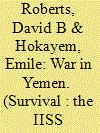

|
|
|
|
|
| Summary/Abstract |
The Yemen intervention has ushered in a new era in the Gulf's security discourse and, perhaps, praxis.
|
|
|
|
|
|
|
|
|
|
|
|
|
|
|
|
|
|
|
|
|